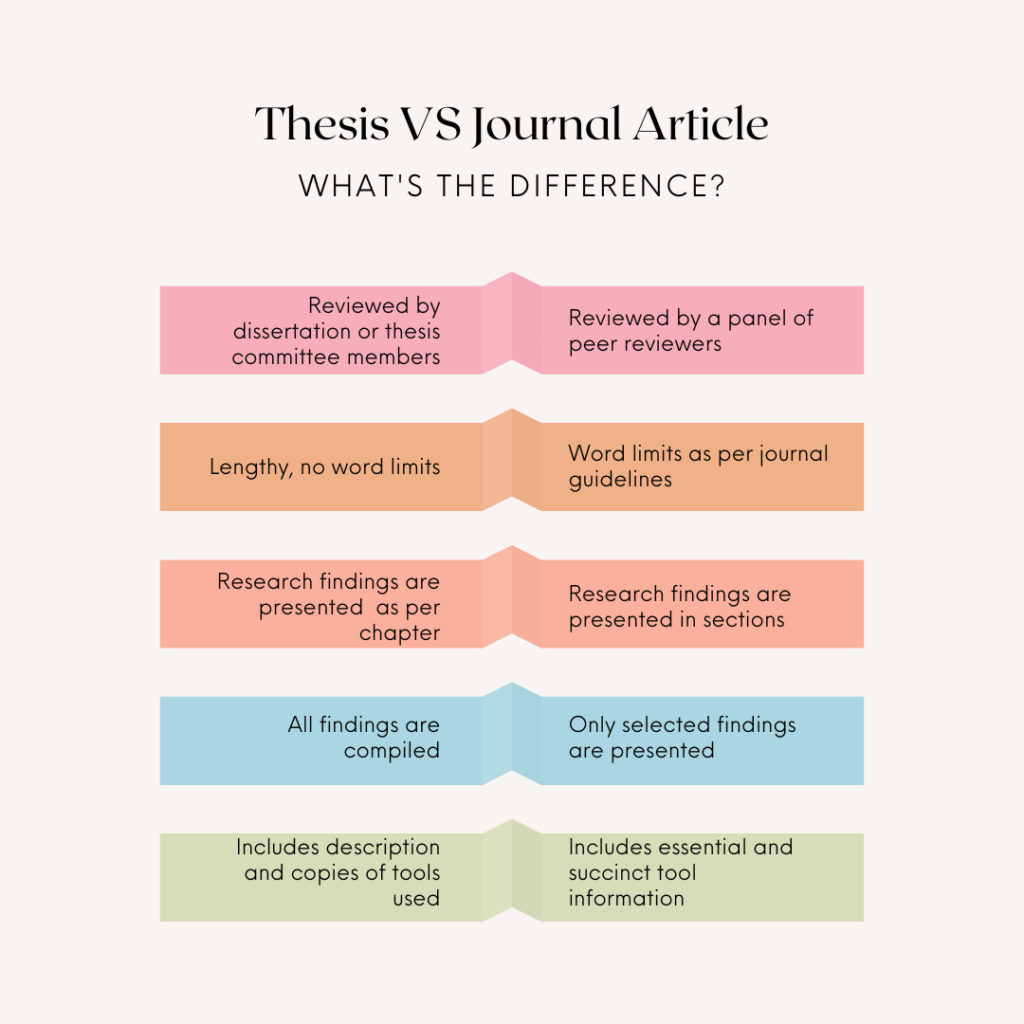Writing a paper from your thesis for publication is not a copy-paste job. Although both a thesis paper and a journal article originate from your academic research, they have different functions and target audiences.
Thesis Paper vs Journal Article:
In general, a thesis paper is typically based on original academic research that aims to contribute new knowledge to a particular field of study. It demonstrates the student’s mastery of the relevant literature as well their ability to plan and carry out a research project. A thesis is usually reviewed by a committee of faculty members, who provide feedback and approve the final version.
In contrast, a journal article is a shorter, more focused piece of writing that reports on specific aspects of research project. Journal articles are typically written by researchers who have completed a study and want to share their findings with a larger audience of experts in their field. Other researchers usually review journal articles and provide feedback and suggestions for revisions. The goal of publishing a journal article is to share the findings of a study and to advance knowledge in a specific field.

Converting the Thesis Paper into Journal Article:
Adapting a thesis for publication as a journal article is time consuming and not an easy task. Most of us might want to do it as a part of academic requirements. However, for other people, who want to establish themselves as a researcher, publishing articles are very critical for their career path. Even if you do not want to pursue a research or academic career path, it is always a good idea to publish articles from your thesis. Any publication demonstrates that you are capable of doing systematic investigations of any problem and finding out a appropriate solution. Apart from that, it also improves your writing skill which in future will help you in different ways.
Here in this article we are sharing some tips that will help you to convert your thesis into a journal article.
Find the Right Journal:
The best approach to find the right journal for your work is to look for the relevant research articles and in which journals those got published. As a beginner your goal should be publishing your work in the right journal, but not in the best one. Be watchful about predatory journals. Make a list of journals whose scope would match your work. If your research work does not fit with the scope of the journal, no matter how novel your work is, you will not be able to publish it. Once you fix the right journal for you, then understand the author guidelines, recommended manuscript structure, format and reference style. Then according to the instructions start preparing your manuscript.
Condense Your Thesis:
In general, journal articles are much shorter than thesis. However, it should be noted that you can produce multiple journal articles from your thesis paper depending upon the length of your work. Here, we are assuming that from your thesis paper you are planning to submit one journal article.
While preparing your draft, consider that you are telling a story to the audience. You should present your finding in such a way so that your data, figures and relevant analysis supporting the story that you are presenting. Therefore, present only those results that fit in the context with your problem statement in the paper. While writing, make sure you are maintaining academic language and structure, else it will be rejected regardless of your novel findings. Do not conclude to any statement that is not supported by your findings. Also, make sure your title matches the content of your paper. To learn more about writing a good title for your article, you can read this article.
Revise your Introduction into Abstract:
Typically, abstract is the last piece of writing that you will work on while drafting your manuscript. An abstract should elaborate upon each major feature of your paper. It should be written in such a way so that it can retain the audience. To ease your work, you can always repurpose your introduction as an abstract by abridging thesis into 100 – 150 words. To learn more about writing abstracts you can follow this article.
Modify the Introduction:
In your thesis, you might have addressed multiple research questions or hypotheses, and all of them might be irrelevant to your journal articles. Therefore, you need to decide which hypotheses to keep and modify the introduction accordingly. In general, the introduction provides readers with the necessary context to understand your paper, the state of knowledge in your field, the question inspiring your work and its significance, how you attempted to answer that question and your findings. Always use relevant references where it is necessary.
Abridge the Method Section:
You do not need to provide details about your research approach. Always keep the method section succinct. To get the best help, download at least three papers from the particular journal and see how the authors wrote their method section. Follow that accordingly.
Report Major Findings in Result Section:
Only present those findings that answer the research questions that you introduced in the introduction section. Always try to provide the data in visual format rather than presenting it in tabulated form. Make sure you provide labels, titles and legends correctly so that the reader does not get confused. It is always a good idea to provide a schematic of your research work as figure one, so that the audience can visualize your work without going through all the texts.
Avoid Verbose Discussion:
Do not repeat your results in the discussion section. Provide a brief interpretation of your results and tell your audience what we can learn from your work. Discuss how your findings have expanded the knowledge or solved a particular problem. If your work had some limitations, do not hesitate to mention that. Finally, you should address how the limitations can be addressed and what can be the future directions of research.
Limit the Number of References:
Journals limit the number of citations. Therefore, you should only cite relevant and most recent publications. Always format the references correctly. You might consider using a reference manager e.g., Mendeley, EndNote etc. to make your life easier.
Disclaimer: ChatGPT was used to compile information for this article. However, the write up is author’s work.

